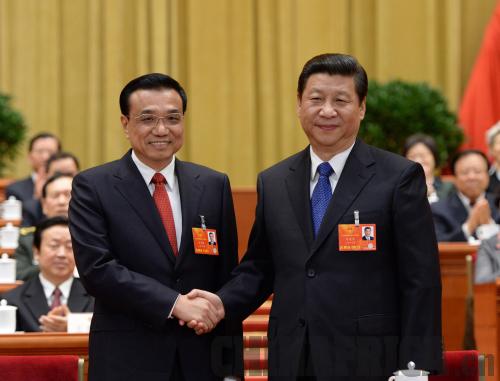|
 |
|
Xi Jinping - President (right) and Li Keqiang - Premier, China's top leaders for the next five years (MA ZHANCHENG) |
Each nation's Constitution is the basis of the country's legal system and should be followed by all the people, as it is the highest law of the land. China is of no exception. At this year's sessions (known as the lianghui in Chinese) of the National People's Congress (NPC), China's top legislature, and the Chinese People's Political Consultative Conference (CPPCC), the country's top political advisory body, the importance of China's Constitution was further underlined.
At the closing meeting of the 12th NPC session, which lasted from March 5 to 17, newly elected leaders, including Chinese President Xi Jinping, Premier Li Keqiang and NPC Standing Committee Chairman Zhang Dejiang, all stressed the importance of governing the country in accordance with its Constitution.
"I will always honestly fulfill my duties as mandated by the Constitution. I will be loyal to our motherland, be loyal to the people and dedicate all my time and energy to my duties and responsibilities to serve the people." Xi made his pledges to the nation before all NPC deputies. He also added that he will give his utmost in his work for the country and put himself under the supervision of the people.
Li made similar statements at his first press conference as Chinese premier. "We will be true to the Constitution, loyal to the people, and the people's wishes will determine the direction of our government's efforts," Li stressed.
It is worth mentioning that many of the newly-elected top leaders studied law. Xi is a doctorate laureate of jurisprudence, having studied law at Tsinghua University; Li holds a master of jurisprudence from Peking University; and Chinese Vice President Li Yuanchao is a doctorate laureate of jurisprudence, and studied law at the Party School of the Central Committee of the Communist Party of China (CPC).
"The fact that a large number of politicians, especially the state leaders, majored in law during their university education can help further promote the rule of law in China," said a commentary in The Beijing News.
"I am glad to see an increasing number of officials with law education backgrounds become leaders. This indicates that the new government will attach great importance to the rule of law, so that everyone can develop in a fair and just environment," said Jiang Ming'an, a Professor at Peking University Law School, in an interview with Xiaoxiang Morning Herald.
Leadership transition
Aside from highlighting the Constitution, this year's lianghui was especially important, as the NPC sessions elected China's new leadership to a five-year term.
On March 14, Xi Jinping, who became General Secretary of the ruling Communist Party of China in late November of last year, was elected president of China and chairman of the Central Military Commission of the People's Republic of China at the NPC session, taking the helm of the world's second largest economy from his predecessor Hu Jintao. Lawmakers also endorsed Li Keqiang as premier of the State Council, China's cabinet, on March 15.
"The new leadership is a group that is well-educated and has experienced the entire process of reform and opening up," said Xie Chuntao, a professor at the CPC Central Committee's Party School.
Born in the 1950s, Xi and Li studied at China's top universities. Xi studied chemical engineering at Tsinghua University, and Li holds a doctorate in economics from Peking University. Both also studied law at their respective academic institutions.
"They participated in, witnessed and benefited from reform and opening up, and know what it was like before, so none of them will look back," said Xie.
Besides their educational backgrounds, both Xi and Li's credentials include experience working in the countryside, which enabled them to better understand the concerns of China's rural population.
It was during their time working in rural areas that Xi and Li received their first official titles. Acting as the Party branch secretaries of their respective production brigades in Shaanxi and Anhui provinces, they had the chance to learn about administration at the community level.
"Such experiences are valuable," said Dai Yanjun, another professor at the Party School of the CPC Central Committee. "This gives them a full understanding of society and the countryside, so that they will address state issues from the viewpoint of common people and focus more on improving people's livelihoods."
Before he was promoted to the central authorities in 2007, Xi held leading Party and government posts in China's relatively underdeveloped hinterland and rural areas, such as a village in Shaanxi, and Zhengding County in north China's Hebei Province, as well as the more prosperous coastal Fujian and Zhejiang provinces and the country's economic hub, Shanghai.
Like Xi, Li also has a rich experience governing at the local level. Aside from being secretary of a village Party branch in east China's Anhui Province in the mid-1970s, Li also served as secretary of the Communist Youth League of China (CYLC) Committee of Peking University. He was a member of the Secretariat of the CYLC Central Committee and the Party chief of central China's Henan Province and northeast China's Liaoning Province.
"This working experience enables them to know what the people need most. This is an ability that cannot be learned from books and gives them a big advantage," Dai said.
|